What lens to get for your Nikon D7500?
Released in June 2017, the Nikon D7500 is a 20.9MP CMOS DX sensor SLR, designed for advanced amateurs, and succeeds the Nikon D7200. for the most notable improvements, we now have a pivotable and touch screen, a new Expeed 5 processor, and we can now shoot in 4K at 30 fps.
The design remains very similar, but the handle is now a little deeper. We lose an SD port, and also farewell the NFC connection, replaced by Bluetooth to send photos to smartphones with Nikon’s Snapbridge application (be careful, it quickly eats battery!). Like its predecessor, it’s not tropicalized.
- Class leading image quality, ISO range, image processing and metering equivalent to the award winning D500
- Large 3.2” 922k dot, tilting Lcd screen with touch functionality. Temperature: 0 °c to 40 °c (32 °f to 104 °f) humidity: 85 percentage or less (no condensation)
- 51 point AF system with 15 cross type sensors and group area AF paired with up to 8 fps continuous shooting capability
Overall it’s a very good APSC camera, with a pleasant handling and very versatile, with very good performance in photography. Video makers will be happy with the 4K and microphone and headset jacks. If you are a beginner or looking for a space-saving DSLR, that might not be the right choice for you! It may offer too many features for a first camera, and there are much lighter cameras if you look at hybrid cameras, for example. If you already own a D7200, you can keep your old camera unless you absolutely need a swivel and touch screen or if you want to shoot in 4K.
Sold alone or in combination with the 18-140mm, the Nikon D7500’s sensor deserves a quality lens to get the most out of it. This article presents a selection of the best lenses compatible with the Nikon D7500, to help you find the most suitable tool for your type of photo, whether it’s to take portraits with a superb blurred background, spectacular wide-angle photos or macro.
Any ideas to improve this list? Do you disagree on the choice of lenses? Please leave a comment!
Note: Product links in this article lead to Amazon.com
How to choose your lens for your Nikon D7500?
Some aspects to be taken into account:
- What is your budget: be careful, prices rise quickly for a good quality lens and they can represent a significant budget.
- What type of photo do you want to take: portrait, landscape, animals, sport…… choose a lens adapted to the situation.
- Weight and size: the more bulky a lens is, the less you will want to take it with you and therefore take pictures. The weight of each objective is therefore indicated. Combined with the Nikon D7500, this can make the camera + lens assembly very heavy!
- Vibration Reduction (VR): not necessarily integrated on each lens, it corrects camera movements and thus avoids blurry pictures.
- Aperture: indicated by the letter’f’ followed by a number: f/1.8, f/2 etc…. to make it simple, the smaller the number, the more beautiful you can take pictures when the brightness is low (and have a beautiful background blur or’bokeh’).
- To choose a Nikon D7500 compatible lens, you can also check examples of images taken with the lens you are interested in on Flickr.com. You will be able to see the rendering of any lens and see what type of image can be made with it.
- Finally, if you buy a lens from a third party brand such as Sigma or Tamron on Amazon, be sure to select ‘Nikon mount‘ at the time of purchase so that it’s compatible with your D7500.
Summary
- Street Photography/Standard
- Portrait
- Wide angle (landscape, acrhitecture)
- All-in-one (for travelling)
- Macro
- Zoom
- Comparative Table
- Useful accessories & links
1. Street photography/Standard
Nikon AF-S DX 35mm f/1.8G
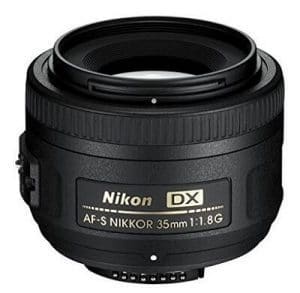
Filter size: 52 mm
If you have a tight budget to buy your first lens, the 35mm f/1.8 should interest you. It’s small, lightweight, and above all it allows you to make a great image for a really affordable price (it’s the cheapest on this list).
The images you get are very sharp, with a pretty blurry background. Since it’s a fixed focal length, you will have to learn to move around to frame your subject, but the difference in image quality with a lens sold in a kit is obvious. The autofocus does the job, in short it offers great performance at its price and I highly recommend it to you. It’s not stabilized or tropicalized, however.
_
☛ OTHER OPTION
- The Sigma 35mm f/1.4 DG HSM ART: three times more expensive but brighter and its sharpness is amazing (it’s designed for full frame, so we get a 50mm on the D7500). Highly recommended.
_
2. Portrait
Nikon AF-S 50mm f/1.8G
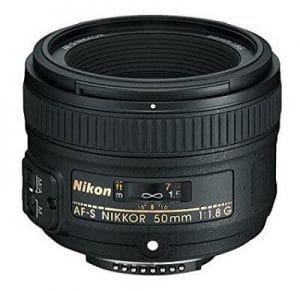
Filter size: 58 mm
Optimized for full-frame FX sensor cameras, this 50mm f/1.8 is also compatible with APS-C/CMOS sensor cameras such as the Nikon D7500. Mounted on it, we then obtain a 75mm, which is an ideal focal length for portrait photography. Don’t worry, we won’t lose any image quality at all! It’s one of the best objectives of this selection in terms of sharpness, but also one of the lightest and cheapest.
Its f/1.8 aperture allows you to obtain a very beautiful bokeh that gives a professional look to your images. It’s very suitable for low-light situations (weddings, concerts…).
If you are an amateur photographer or a complete beginner, this 50mm f/1.8 is to be tried urgently on your Nikon D7500.
_
Nikon Nikkor AF-S 85mm f/1.8G
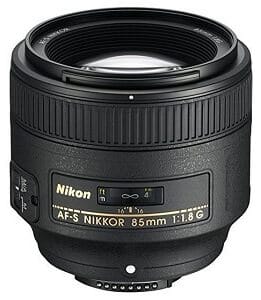
Filter size: 67 mm
Yet another lens optimized for FX cameras but which can be used on a DX sensor camera. With its slightly longer focal length it can be used for portrait photography but also for sports events or concerts. In terms of image quality, it offers an impeccable rendering.
Be careful though, it costs twice as much as the 50mm and it’s also twice as heavy, a point to take into account when buying… but if you decide to switch to a full size camera later, it may be a good choice.
3. Wide angle
Sigma 10-20mm f/3.5 EX DC HSM
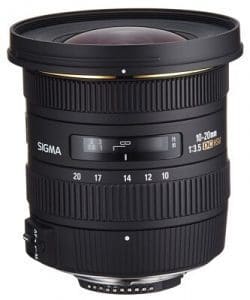
Filter size: 82 mm
A super wide angle lens that allows you to take spectacular pictures. Quite compact and with a good quality of manufacture, its autofocus is fast and it delivers very sharp images, even if we notice a little distortion visible at 10mm. The fixed aperture of f/3.5, without being exceptional, allows to take pictures where the brightness is not very good or where it’s impossible to use a flash.
It’s also one of the cheapest wide angles for Nikon DX cameras, and is sold with a protective pouch and a lens hood.
If you want to take pictures of landscapes, architecture or interiors, that’s the right thing to do.
_
Tokina 11-16mm f/2.8 AT-X PRO DX II
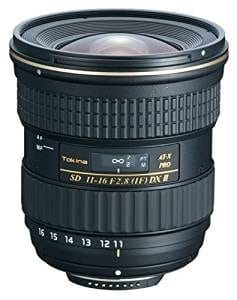
Filter size: 77 mm
An interesting alternative to the Sigma 10-20mm, in the same price range, with a good construction and which offers very sharp images. However, it’s a little heavier than Sigma and the distortion is visible up to 16mm (although reasonable). It’s possible to fix this problem by using image editing software such as Lightroom, for example.
The constant aperture of f/2.8 is brighter than Sigma and will be more suitable in low-light situations. It can even be used for astrophotography.
_
4. All-in-one
Sigma 17-70mm f/2.8-4 DC Macro OS HSM
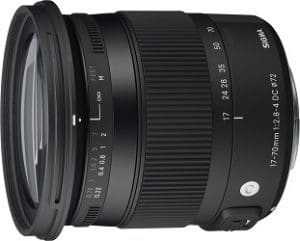
Filter size: 72 mm
One of the best all-in-one lenses, stabilized, with a precise and fast autofocus, quiet, with a useful amplitude and as compact as an 18-55mm lens supplied as a kit. It delivers very good image quality over the entire focal range. Its aperture is relatively fast and allows to photograph in low light conditions.
The only downside, however, is that the image quality is lower at 17mm, with low dive angles and quite noticeable distortion. The ‘Macro’ name is not as special as it sounds but offers correct results if you want to take pictures of small subjects. The minimum focusing distance is 22 cm.
Click to see the price_
☛ OTHER OPTIONS
- The Nikon 16-80mm f/2.8-4 AF-S Nikkor VR, quite expensive but with high overall performance.
- The Sigma 17-50 mm f/2.8 DC EX OS HSM, fixed aperture of f/2.8 over the entire focal range, but quite heavy (570g).
_
Nikon 18-200mm f/3.5-5.6G AF-S IF ED VR II
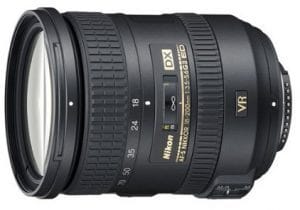
Filter size: 72 mm
Very good choice for those who want a versatile lens and quality results. Be careful, its weight is significant even if it’s not very large in size. It has a large focal length, and for this budget it’s one of the best all-in-one zoom lenses. It will be suitable for those who do not want to change lenses several times during the trip (for fear of putting dust on the sensor).
It offers pretty images, with natural colors and a correct sharpness (do not expect results as good as with a fixed focal length however!). In low light the VR system helps enormously by reducing the risk of blurred photos.
_
☛ OTHER OPTION
- The Tamron 16-300mm F/3.5-6.3 Di II VC PZD MACRO (a little less heavy and cheaper, wider angle but autofocus a little slow)
_
5. Macro
Sigma 105mm f/2.8 DG OS HSM
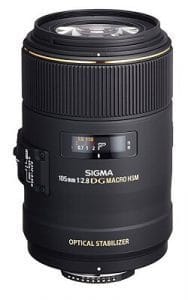
Filter size: 62 mm
This is the lens to get if you want to take beautiful macro photos (insects, cooking…) but also beautiful portraits. It works on both full-frame FX and DX cameras, so you can keep it with you if you ever decide to switch to full-frame. On a Nikon D7500, this Sigma 105mm f/2.8 gives a focal length equivalent to 160mm, with a minimum focusing distance of 31cm.
The constant aperture of f/2.8 allows you to have a nice background blur. On a big positive note, the highly effective Sigma OS stabilizer is extremely practical for the macro. Its weight is quite heavy, but if you want an excellent image quality to make macro with your Nikon D7500, it’s simply a great lens and a perfect option for macro photography.
_
Nikon 40mm f/2.8 AF-S DX Micro
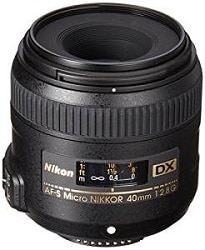
Filter size: 52 mm
One of the lightest lenses in this selection, at an affordable price and with a correct finish, equipped with a silent autofocus system. In addition, it’s tropicalized with a metal frame with a gasket. It’s ideal for macro photography but can also be used to take portraits thanks to its 40mm focal length.
With its maximum bright aperture of f/2.8, photos are very sharp even in low light and beautiful background blurred. Its minimum focus of 16.3 cm allows you to capture all the details on flowers, jewellery or insects. Too bad it doesn’t have integrated stabilization.
_
☛ OTHER OPTIONS
- The Nikkor 105mm f/2.8G (expensive, heavy – 750g – but tropicalized and extra image quality)
- The Nikon Micro 85mm f/3.5G ED VR II (Heavier, more expensive and less bright than 40mm but has VR vibration reduction and offers very sharp images)
_
6. Zoom lenses
Nikon AF-S DX 55-300mm f/4.5-5.6 ED VR G
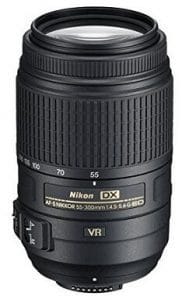
Filter size: 58 mm
A very useful lens to have in addition to a standard lens: it allows you to zoom up to 300mm to get as close as possible to the subject of the photo but it is also suitable for portrait photography. Stabilized and silent, it is a very good zoom for beginners who would like to take pictures from a distance (animals, sports…).
A warning regarding the Sigma and Tamron zoom lenses sold at low prices: most of them do not have a vibration reduction system! This is an important point to take into account to avoid missing every other photo, so choose Nikon directly if you want to avoid disappointments!
Click to see the price_
Sigma 150-600mm f/5-6.3 DG OS HSM | Contemporary
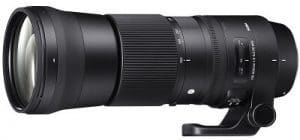
Filter size: 95 mm
A perfect telephoto lens for animal or sports photographers, which has received many praise in the specialized press and on the web: it offers excellent image quality with an impressive level of detail. Its manufacturing quality is excellent, the autofocus very precise and the OS optical stabilization is very practical.
For the negative points: its weight (nearly 2 kg), and the rather weak aperture. We also notice a little vignetting on all focal ranges. But these are the few compromises to make to enjoy a super telephoto lens that will not scare the animals! In short, this Sigma 150-600mm is an excellent choice for animal photography.
An optional USB dock is available for updates and to set up autofocus and other settings.
There is a ‘sport‘ version, tropicalized and more solid but much heavier than the contemporary version (1kg more). Otherwise, the image quality is the same.
_
☛ OTHER OPTIONS
- The Tamron 150-600 mm f/5.0-6.3 SP DI VC USD G2 offers the same performance as the Sigma 150-600mm, but may be a little better from 500mm. It is more expensive.
- The Nikon AF-S DX 55-200mm f/4-5.6, very light and at an almost reasonable price…
- The Nikon 70-200mm f/2.8G AF- S NIKKOR ED VR II, extremely high price but superb image quality.
- The Nikon 200-500mm f/5.6 AF-S NIKKOR E ED VR, more affordable, with a powerful focal range and extra sharpness.
_
7. COMPARATIVE TABLE
All of the Nikon D7500 compatible lenses mentioned above are included in this comparison chart to help you choose the right equipment. You will be able to compare them according to their price, the weight and the utility of each one to choose which will suit your budget and your style of photo.
Note: Product links lead to Amazon.com
_
8. USEFUL ACCESSORIES & LINKS
A small selection of useful accessories to have in addition to your lenses and your Nikon D7500:
USEFUL LINKS
- All the lenses of the DX series on Nikon USA
- Nikon D7500 reviews round-up
Order the Nikon D7500 HERE for the lowest price available:
Nikon D7500 Body only (Amazon): https://amzn.to/2LwNcyZ
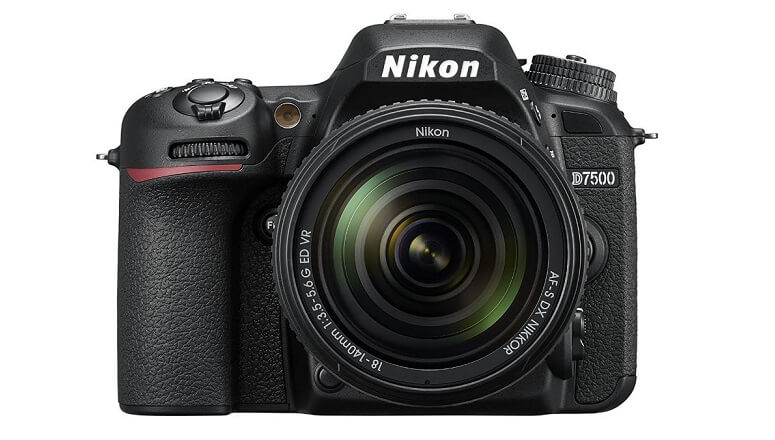

1 thought on “The best lenses for Nikon D7500”